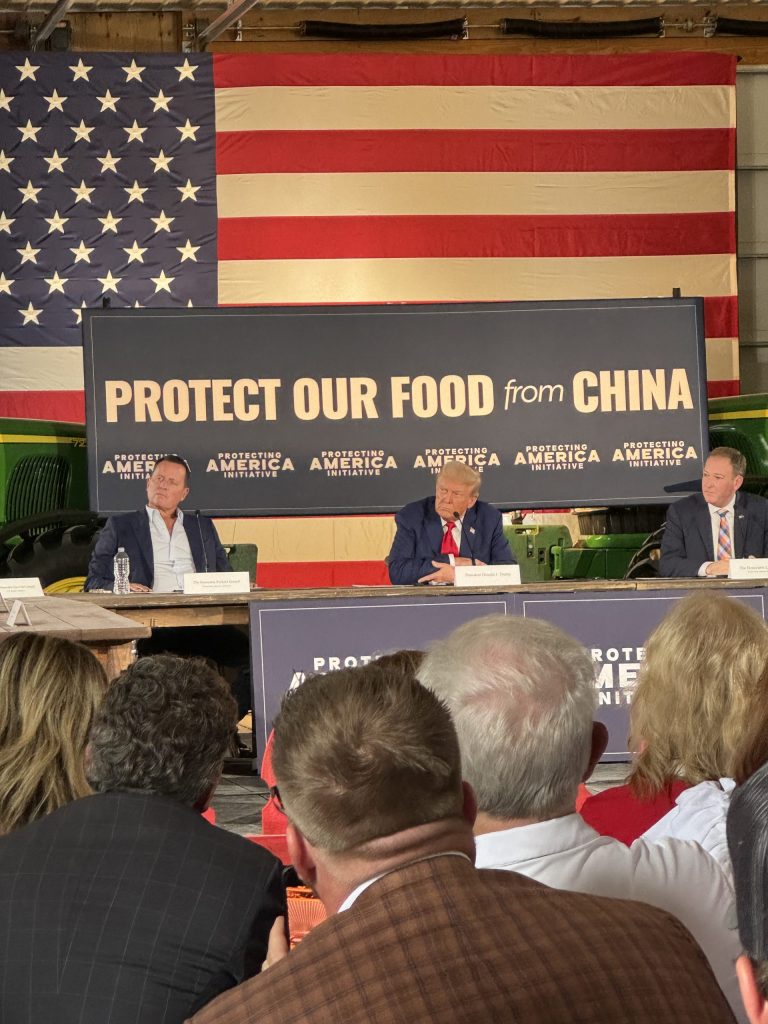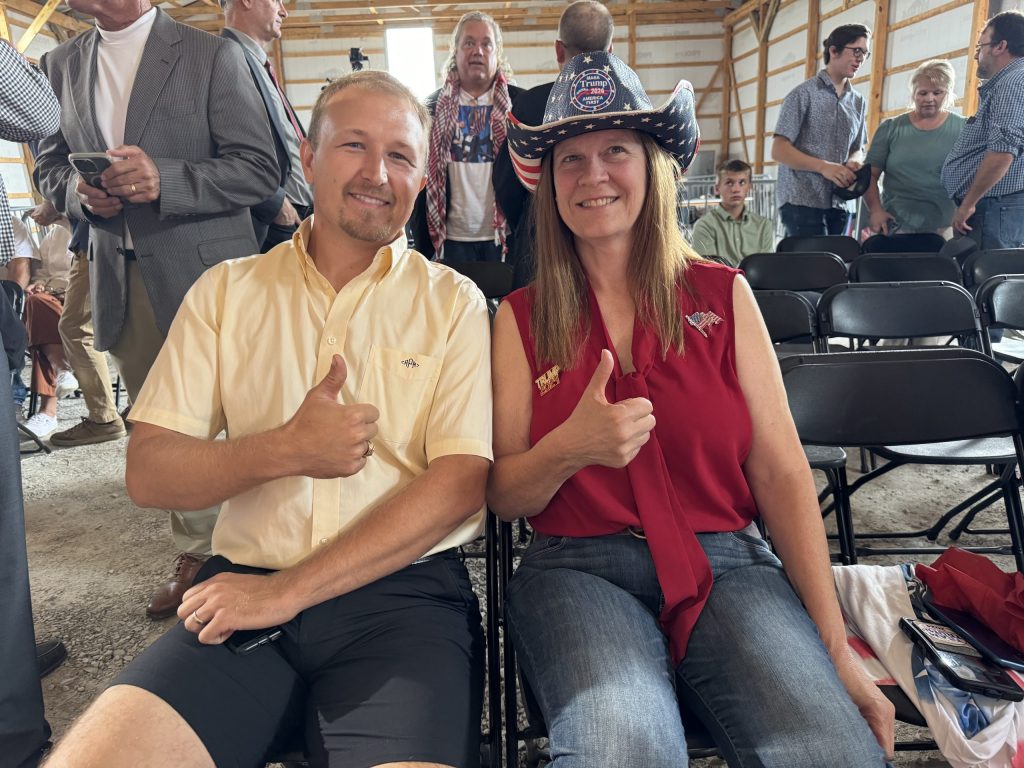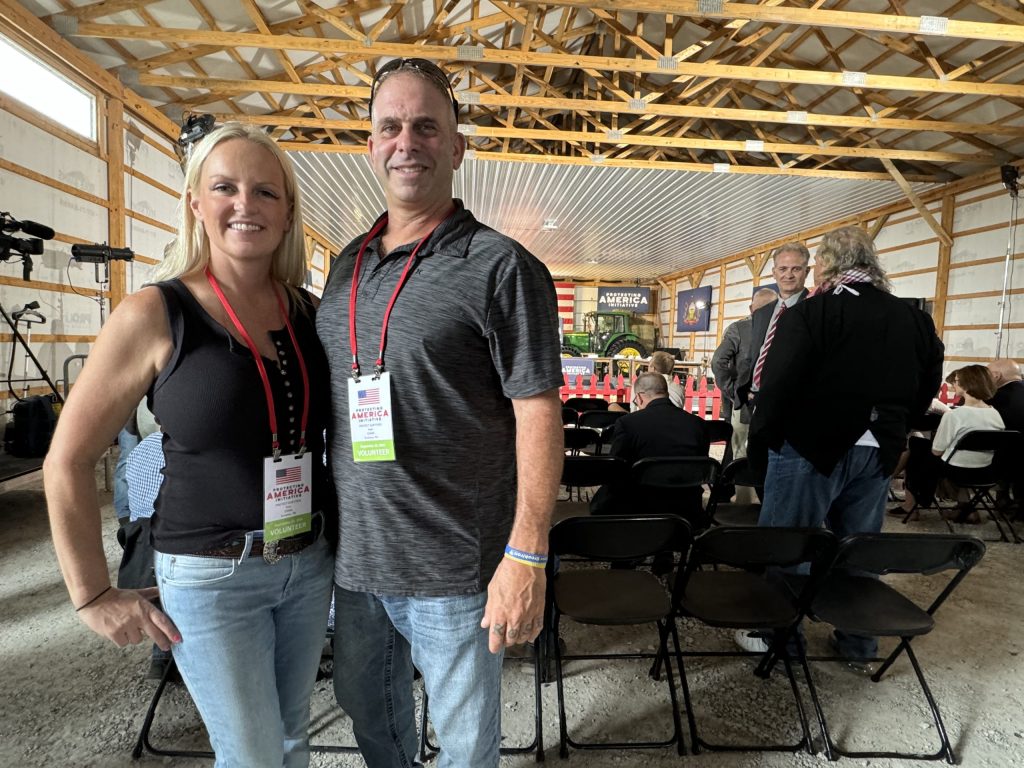Trump: China buying U.S. farmland a threat to American farmers
Former president meets with farmers at Smithton event
SMITHTON – Former President Donald Trump returned to Western Pennsylvania Monday afternoon, stopping at a Westmoreland County farm to address potential risks of Chinese ownership of farmland in the United States.
About 60 people attended the private event, held in a barn at the Smith Family Farm in Smithton and hosted by the nonprofit Protecting America Initiative.
Trump sat with a roundtable of panelists, including Western Pennsylvania farmers from Washington, Fayette and Westmoreland counties, for about 90 minutes.
“Nobody’s done for farmers what I’ve done,” Trump said, telling them he would require China to buy $50 million of American agricultural products.
Trump has vowed to ban Chinese nationals from purchasing U.S.farmland if he wins the presidency in November, amid bipartisan concerns over potential threats to national security, food security, and trade.
“From buying up farmland to influencing state legislative outcomes by directly lobbying lawmakers, the Chinese government will stop at nothing to exert control in the United States,” Protecting America Initiative said in a news release.
The panelists talked about the challenges they face in the agricultural industry and on their farms.
Todd Reamer owns a beef farm in Westmoreland County.
“My concern today is with foreign buying up farmland, young Americans can’t afford to buy a farm or even get started,” said Reamer, who purchased his farm 30 years ago. “I know there are young farmers out there who really aspire to own a farm or ranch but can’t because of the high costs. We hear the word ‘sustainable,’ but to stay sustainable we need to give Americans a chance to own farms and ranches so they can continue to produce the safest food supply in the world for generations to come.”
The total amount of foreign-owned agricultural land in the U.S. has risen sharply over the past decade, especially for Chinese-related holdings.
According to the U.S. Department of Agriculture, foreign persons and entities owned 40.8 million acres of U.S. agricultural land in 2021, about 3% of the total amount.
Five countries – Canada, the Netherlands, Italy, the United Kingdom, and Germany – account for approximately 62% of all foreign-owned U.S. agricultural land, with Canada holding 12.8 million acres, a 31% share.
At the end of 2021, China’s ownership of U.S. farmland sits at about 384,000 acres, or about 1% of total foreign-owned U.S. agricultural land.
Currently, 24 states have some kind of restrictions on foreign ownership of land (those restrictions vary), and more are considering them.
Earlier this year, Pennsylvania House Republicans, citing threats from unfriendly nations including China, introduced a package of bills aimed at restricting foreign ownership of farmland and protecting critical infrastructure.
According to the 2021 USDA’s 2021 Agricultural Foreign Investment Disclosure Act report, no Chinese-owned land was held in Washington, Greene, Fayette or Westmoreland counties, while 45 acres of farmland was Canadian-owned in Washington County.
Among those who attended the event were John and Rose Joseph of Connellsville, who own JJ Angus, a 900-head cattle farm.
“When we heard (Trump) was coming this close, we knew we had to be here,” said Rose Joseph, who brought food – including beef from the farm – for staff, volunteers, and security and provided a John Deere tractor for the stage, which included a “Protect our food from China” sign and a large American flag.
“If China is allowed to buy all of this land, that is going to start taking away from farmers who could produce good, local food and we don’t know what China’s doing with the land,” she said. “They’re not going to come in and farm it; they’re going to put solar panels up, and it’s going to cut down on us being able to produce our own food, and that’s very concerning because I think the best food you can produce is something that comes straight off the farm.”
Trump touched on several issues, including fracking, immigration, tariffs, fentanyl and drugs, and the looming election.
Trump said he would impose a 200% tariff on John Deere and other American companies if they move their operations to Mexico, and said he would reduce energy bills by 50% within the first year if he is elected, but didn’t provide specifics. He also said Chinese President Xi Jinping told him China would impose the death penalty for fentanyl dealers in China who delivered the drug to the U.S.
At the end of the event, Trump responded to a reporter’s question that some economists he spoke with said they don’t see how Trump’s tariff proposals won’t make items cost more in the United States by saying he would push for tariffs on imported goods even if Congress did not approve them.
“I don’t need Congress but they’ll approve it. I’ll have the right to impose them myself if they don’t. I’d rather get their support. The ones that understand business all support it,” he said.
After the mid-day campaign stop, Trump headed to Indiana University of Pennsylvania in Indiana County for a rally at the Ed Fry Arena.
With 43 days until the election, Pennsylvania remains a pivotal state for Trump and Democratic opponent Vice President Kamala Harris.
Harris is scheduled to visit Pittsburgh on Wednesday. Recent polls show a tight race.
Trump won Pennsylvania in 2016. Biden flipped the state in 2020, but Westmoreland County voted 63% for Trump and he won 68% of the votes in Indiana County.




